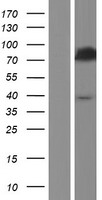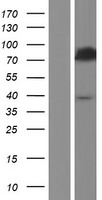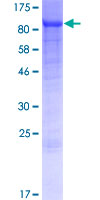order histories, retained contact details for faster checkout, review submissions, and special promotions.
Forgot password?
order histories, retained contact details for faster checkout, review submissions, and special promotions.
Location
Corporate Headquarters
Vector Laboratories, Inc.
6737 Mowry Ave
Newark, CA 94560
United States
Telephone Numbers
Customer Service: (800) 227-6666 / (650) 697-3600
Contact Us
Additional Contact Details
order histories, retained contact details for faster checkout, review submissions, and special promotions.
Forgot password?
order histories, retained contact details for faster checkout, review submissions, and special promotions.
ACS5 / ACSL5
acyl-CoA synthetase long-chain family member 5
Acyl-CoA synthetases (ACSL) activate long-chain fatty acids for both synthesis of cellular lipids, and degradation via beta-oxidation. ACSL5 may activate fatty acids from exogenous sources for the synthesis of triacylglycerol destined for intracellular storage (By similarity). Utilizes a wide range of saturated fatty acids with a preference for C16-C18 unsaturated fatty acids (By similarity). It was suggested that it may also stimulate fatty acid oxidation (By similarity). At the villus tip of the crypt-villus axis of the small intestine may sensitize epithelial cells to apoptosis specifically triggered by the death ligand TRAIL. May have a role in the survival of glioma cells.
| Gene Name: | acyl-CoA synthetase long-chain family member 5 |
| Family/Subfamily: | Non-Protein Kinase , not assigned-Non-Protein Kinase |
| Synonyms: | ACSL5, ACS2, ACS5, FACL5, Fatty acid coenzyme A ligase 5, Phosphatidylinositol 4-kinase, LACS 5 |
| Target Sequences: | NM_016234 NP_057318.2 Q9ULC5 |








If you do not find the reagent or information you require, please contact Customer.Support@LSBio.com to inquire about additional products in development.










